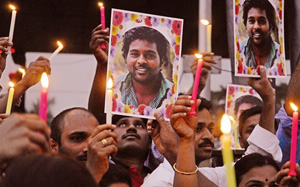Hyderabad, Jan 27: Six of the seven students of the Hyderabad Central University (HCU), on hunger strike to protest the suicide of Dalit scholar Rohith Vemula, have been shifted to a health centre even as the agitators today took out a march to the residence of the interim head of the institution.
The students, who had given a nationwide university strike call, marched to the residence of the interim head of the institution and then went outside the campus and burnt the effigy of the Vice-chancellor, whose ouster they have been seeking.
"Six (students) were shifted (to the health centre) yesterday", Ravindra Kumar, chief medical officer said.
One student is continuing with the hunger strike, which resumed three days back after the first batch of his colleagues who went on fast were moved to the health centre.
The students first marched to the residence of the officiating Vice-Chancellor Vipin Srivastava in the staff quarters.
Srivastava was given the charge of the institution after VC Aappa Rao went on leave amid escalation of protests last week.
But selection of Srivastava as interim head of the institution was stiffly objected to by the students and SC/ST staff forums alleging he headed the Executive Council sub-committee whose decisions were "responsible for the death of Rohith" and was one of the accused in the death of another dalit student in 2008.
Srivastava had yesterday made a fresh appeal to students to help restore normalcy on the campus.
Rohith was found hanging in a hostel room on the HCU campus on January 17, sparking strong reactions on the campus and across the country.
Rohith and four other students, all from the dalit community, were suspended last year by the varsity for allegedly attacking an ABVP leader.
The suspension of the four students were revoked last week after the issue snowballed into a major political row with the agitation drawing support from parties other than the BJP.





Comments
Add new comment